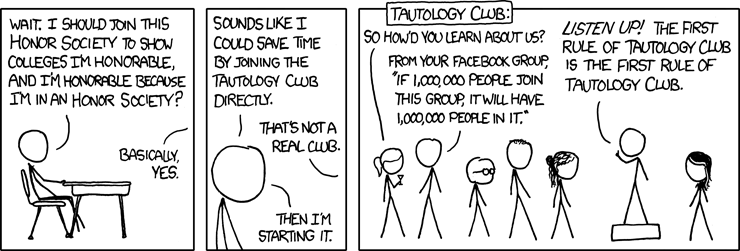-
Posts
6430 -
Joined
-
Last visited
-
Days Won
28
Posts posted by mordorbund
-
-
On 11/25/2023 at 2:26 PM, Traveler said:
When I was in the bishopric, we had 4 small children and the two older boys were difficult for my wife to handle by herself. I asked the bishop if I could have one of my boys sit with me on the stand. It worked and my boys were better behaved for it.
Alternate title for Trib article:
Bay Area Relief Society Finally Deemed Reverent Enough to Rejoin Congregation
- Vort, JohnsonJones, zil2 and 3 others
-
 6
6
-
3 hours ago, Carborendum said:
Happy Thanksgiving!

For those outside the US, Thanksgiving is something of a harvest festival made into a national holiday by Abraham Lincoln (yes, THAT Lincoln). Every time someone sets up Christmas decorations too early a turkey dies. After seeing how difficult it is to change American culture, Lincoln stopped fighting it and declared an annual holiday for eating dead turkey.
- Carborendum, JohnsonJones and zil2
-
 1
1
-
 2
2
-
20 hours ago, zil2 said:
Has anyone heard of the Church developing a home schooling program? (Have a friend who's interested.)
Thanks!
I don’t know if it was officially sponsored by the Church, but Joy School used to be a coop curriculum in the 80s. https://www.deseret.com/2011/7/28/20206386/mormon-parenting-childhood-comes-before-school
-
For a satirical take on password woes, create a new password using the Password Game! https://neal.fun/password-game/
-
On 11/16/2023 at 2:40 PM, NeuroTypical said:
COVID lockdown was lit. In my stake, we had an older couple who fumbled about with their settings, such that all the attendees witnessed their 'intimate moment'.
Well of course. Just because it's remote, doesn't mean the ward members should give up all their sacrament customs.
-
Study pattern:
-
Purpose
Each study session has a purpose. Often it is an extension of the previous study's purpose. Begin with prayer and state the purpose. "Investigate the different creation accounts, see how they differ, and discover what the similarities and differences teach" "Learn my responsibilities and privileges as a deacon" "Select a person from my reading that I most relate to" "Find something of interest in this week's reading assignment" "Memorize 3 verses I learned about yesterday" "Cross reference my patriarchal blessing with the scriptures" -
Prework
These don't necessarily happen in the study session (unless you make that your purpose of study that day) but these are "helps" or resources you rely on in your more general studies. This might include such things as surveying the Gospel Library App to see what's available for your subject (if studying the D&C it's helpful to have some Church history resources), learning historic timelines and facts (such as where the saints were gathered and when (for D&C), or the rise and fall of ancient empires (for OT), geography (OT, NT, BM), revelation names (D&C)), or even memorizing scripture/official declarations for when phrases come up later. Oh yeah, I did an exercise during my first NT seminary class where we searched through the NT footnotes for references to the JST and marked them with a highlighter. I went back and did that for the OT as well. You should definitely do that. -
Study
This is where you do what you typically think of as "studying" -- sit on your keister and read until it sinks in. But don't just do that, apply some principles.- Be curious - you may come across curiosities as you're reading, feel free to explore them a little bit. If they're taking too long or are distracting then make a note for a future study topic and return to the current topic (assuming the Spirit isn't driving you to the curiosity). "I wonder what it means by 'the cause of Zion'? Huh, it's come up a few times... and the Church hasn't even been organized yet....". Mosiah 19:4 "wait, was there a ceremony that I missed?"
- Use other resources -- student manuals and other entries (in the Gospel Library app) can provide Catch 22 context -- if you already know about it you probably don't need to look at it again, but if you don't already know then you don't know you need to look it up. This is also where you refer to previous notes, timelines, maps, from prework.
- Ponder -- Just because you "finished studying" doesn't mean you've finished studying. Throughout the day as you have time to reflect, ponder what you studied. This helps solidify in your memory what you studied, provides opportunities for feedback loops, and provides opportunities for personal revelation.
- Feedback loops -- sometimes you may come across connections from your other studies or observations (listened to some sort of counselor list out principles for building meaningful relationships and realized those are the same things God asks of us -- almost like prophets know a thing or two). These then return back to your study for additional insights
- Make notes for yourself -- sometimes it's helpful to diagram to get a better understanding of what's going on. This can turn into a bit of a prework tangent by creating maps, timelines, family trees and such, but mostly it's an exercise of physically organizing your thoughts.
- Make notes for future you -- that's a great insight you got from your study session. It'd be a real shame if you ever forgot it. Four years from now when your read the same passage again you won't remember that you thought anything of it. You don't necessarily need anything major but it should be enough to jog your memory (it may just be a new footnote referencing one of the study helps discussed earlier, then you can check the reference if you want to learn more)
-
Share
As with ponder and purpose, share helps solidify your memory. You probably remember scriptures you quoted in talks or lessons better than other scriptures because you made sure you understood them well enough that you could present them and (if teaching) could answer questions about them. Have a "good news" buddy you can share with (a "good news" buddy is someone you can share good news with and feel even better about yourself because of how well they rejoice with you). You don't have to share every time but you should be preparing to present every time you study.
Case study:
Purpose: Pray to "Find personal meaning from Psalm 24"
Prework: 1) Psalms is the Old Testament Hymnal. It was meant to be sung probably by a choir. 2) When I read through Song of Solomon I recognized 3 character parts in it (man, woman, group). I took the time to label these and it made my reading easier (I was very pleased when I saw the NIV also did the same, labeling the group "chorus").
Study: Start reading the Psalm. "... Who shall ascend to the hill of the Lord? Or who shall stand in his holy place? He that hath..." curious -- is that a call and response? <continue reading> "... Who is the King of glory? the Lord strong and mighty..." curious What is this? catechism? call and response? prework Let's break this down like Song of Solomon and see if I can make sense of it.
Focusing on the questions, assign Caller, Responder, chorus(?) - something like
QuoteCh: The earth is the Lord’s, and the fulness thereof; the world, and they that dwell therein. For he hath founded it upon the seas, and established it upon the floods.
C : Who shall ascend into the hill of the Lord? or who shall stand in his holy place?
R: He that hath clean hands, and a pure heart; who hath not lifted up his soul unto vanity, nor sworn deceitfully. (should Ch pronounce blessing? No, let's keep it here since it's about "he" but change on the next since it's "generation") He shall receive the blessing from the Lord, and righteousness from the God of his salvation.
Ch: This is the generation of them that seek him, that seek thy face, O Jacob. Selah.
Ch: (Ch again? Selah suggests a break, but format-wise it starts both with Ch so I guess it's good) Lift up your heads, O ye gates; and be ye lift up, ye everlasting doors; and the King of glory shall come in.
C : Who is this King of glory?
R: The Lord strong and mighty, the Lord mighty in battle.
Ch: Lift up your heads, O ye gates; even lift them up, ye everlasting doors; and the King of glory shall come in.
C : Who is this King of glory?
R: The Lord of hosts, he is the King of glory. Selah.
Work on some variations: Ch doesn't have to be a chorus, maybe that's like the King's messenger. Then C is asking the important questions. Then R can be Ch informing them how to prepare for the King. Only 2 parts required.
C in the second part could be the gates themselves singing.
notes Some thoughts on the Second Coming
share Pretend like I have a friend who enjoys poetry and defend my partitioning
ponder Later in the day imagine the following vignette:
QuoteFather and young Son (maybe 4 or 5?) in the yard. Son has a mound of dirt and a little moat around it where he's built a small city. Father finishes watering plants and joins him.
Father: (picking up dirt and building up the mound) The earth is the Lord’s, and the fulness thereof; the world, and they that dwell therein. (fills the moat) For he hath founded it upon the seas, and established it upon the floods.
Son: Who shall ascend into the hill of the Lord? or who shall stand in his holy place?
Father: (washing Son's hands) He that hath clean hands, and a pure heart; who hath not lifted up his soul unto vanity, nor sworn deceitfully. He shall receive the blessing from the Lord, and righteousness from the God of his salvation. (returns home with Son)
Father: (in prayer, filled with gratitude) This is the generation of them that seek him, that seek thy face, O Jacob.
notes: Some better thoughts
- zil2 and Carborendum
-
 1
1
-
 1
1
-
Purpose
-
On 11/10/2023 at 2:15 PM, LDSGator said:
I’m not sure anyone has had their mind changed after a debate. Especially an online one on such a loaded topic.
I agree that very rarely does a person participating in a debate changer their mind from the debate, but it does happen. Dave Rubin went full derp-face while interviewing Larry Elder and subsequently changed his views on black victimhood narratives.
@NeuroTypicalhas more experience with online debates than I do, but I’m sure he’ll agree that the person you’re trying to convince is not the die-hard staring at you but the silent lurker sitting on the fence observing the proceedings. These individuals change their minds all the time because they’re coming to the debate wanting to be persuaded.
- Vort, NeuroTypical, LDSGator and 1 other
-
 4
4
-
20 hours ago, zil2 said:
Irony: Pursuit of the perfect mortal body over obedience to God will yield in eternity at best a terrestrial body - one as much less in glory compared to a celestial body as the moon differs from the sun in brightness. You may have it in mortality (until age or injury or disease takes it from you), but then in eternity you will end with something far less (in other words, your efforts will have been for naught). Set your sights on something greater - the glory of God - regardless of the consequences.
This reminds me of some of the examples President Kimball gave in The False Gods We Worship.
QuoteOne young man, when called on a mission, replied that he didn’t have much talent for that kind of thing. What he was good at was keeping his powerful new automobile in top condition. He enjoyed the sense of power and acceleration, and when he was driving, the continual motion gave him the illusion that he was really getting somewhere.
All along, his father had been content with saying, “He likes to do things with his hands. That’s good enough for him.”
Good enough for a son of God? This young man didn’t realize that the power of his automobile is infinitesimally small in comparison with the power of the sea, or of the sun; and there are many suns, all controlled by law and by priesthood, ultimately—a priesthood power that he could have been developing in the service of the Lord. He settled for a pitiful god, a composite of steel and rubber and shiny chrome.
-
- zil2, Carborendum and Vort
-
 3
3
-
20 hours ago, Just_A_Guy said:
the capability for auto-play is definitely there.
Eulalie Mackecknie Shinn has entered the chat
-
-
3 hours ago, mikbone said:
“Dude did you see that thing?!?!”
”Yeah, it was … I don’t know what!”
”<squealing in shock>”
”I mean…. It was…… did you see…..”
”You talking about that thing with the short nose?”
<group stare >
”<still squealing in shock>” -
My brother introduced the phrase to us when we lived in Texas back in the last century.
Later I learned others knew the joke too.
https://www.churchofjesuschrist.org/study/friend/1988/01/charades?lang=eng
https://www.churchofjesuschrist.org/study/friend/1989/03/brother-to-brother-part-three?lang=eng
https://www.churchofjesuschrist.org/study/friend/1997/01/doing-good-to-all-men?lang=eng
-
On 10/1/2023 at 6:01 AM, Carborendum said:
It was "three days" because it was three days. It was "three days and three nights" because it was three days and three nights. He rose "on the third day " because He rose on the third day. And they all mean the same thing because they all mean the same thing.
In that moment, all of Tautology Club knew they made the right choice.

- zil2, Vort, Carborendum and 1 other
-
 4
4
-
-
-
29 minutes ago, askandanswer said:
In Australia we have something called an advanced medical directive. Its basically a legally binding document giving instructions to medical staff about how you would like to be treated if you are no longer capable of making your own decisions. It also includes instructions about whether or not doctors should try to revive you if you suffer some sort of catastrophic event and nominates who should switch off the life support system.
My mum is far from being on life support or anything similar. However she is making preparations for the possibility that it might one day happen. She called me last night to ask if I would be the one willing to switch her off if she was ever in that situation. I told her I would need to think about it.
I’m a bit uncertain about it. On the one hand I would like to honour her wishes. On the other hand I see how it as akin to killing someone. I can also see how I would be the better person to ask compared with my siblings. One sibling would never do it under any circumstances, another sibling would do it without hesitation or consultation. I think my decision about whether or not to agree with mum’s request will be significantly influenced by church teachings and practices on this topic.
Does anyone know what the church’s teachings are on the cessation of life support systems?
In the US that directive is called a living will.
The Church uses strong language against euthanasia (violates the commandments of God) but notes that what you describe is not euthanasia. Here’s the relevant section in the Handbook of Instruction:
QuoteProlonging Life (Including Life Support)
When facing severe illness, members should exercise faith in the Lord and seek competent medical assistance. However, when dying becomes inevitable, it should be seen as a blessing and a purposeful part of eternal existence (see 2 Nephi 9:6; Alma 42:8).
Members should not feel obligated to extend mortal life by extreme means. These decisions are best made by the person, if possible, or by family members. They should seek competent medical advice and divine guidance through prayer.
Leaders offer support to those who are deciding whether or not to remove life support for a family member.
-
@prisonchaplain When gay marriage was in the courts, the Church of Jesus Christ filed an amicus with the Family Proclamation to show our interest in the decision. I know Assemblies of God has official faith statements, do you have one on the family? Or is there a body of statements from National Councils on the topic?
-
-
38 minutes ago, prisonchaplain said:
The conservative backlash is that every child has a right to a two-parent home.
You forgot to include quotation marks.
”Children are entitled to birth within the bonds of matrimony, and to be reared by a father and a mother who honor marital vows with complete fidelity.”
This backlash comes with prophetic warning:
QuoteFurther, we warn that the disintegration of the family will bring upon individuals, communities, and nations the calamities foretold by ancient and modern prophets.
We call upon responsible citizens and officers of government everywhere to promote those measures designed to maintain and strengthen the family as the fundamental unit of society.
- Traveler, prisonchaplain and Vort
-
 2
2
-
 1
1
-
4 hours ago, zil2 said:
less than 9¢ / page
Anyone else read this and hear Nibley say “that’s not bad for Xerox”?
- JohnsonJones and zil2
-
 2
2
-
4 hours ago, Carborendum said:
I just began with a client. During their 5-hr orientation, they spent two hours talking about their DEI program
- NeuroTypical, SilentOne and Carborendum
-
 1
1
-
 1
1
-
 1
1
-
8 minutes ago, mordorbund said:
Ugh! What does the bear’s race have to do with anything?
7 minutes ago, mordorbund said:Winnie-the-Pooh getting a shakedown for not paying for his honey habit
4 minutes ago, mordorbund said:Bear from Song of the South holds Magic Kingdom hostage after being “erased from Disney history”
@mordorbund shouldn’t you get a life or something?
- LDSGator, NeuroTypical and Carborendum
-
 2
2
-
 1
1
-
- Carborendum and LDSGator
-
 2
2











For NeverTrumpers: An appeal to not vote Hillary over Trump
in Current Events
Posted
Yeah, could you you imagine how liberals would act if there was another Kennedy running for public office?